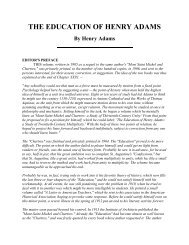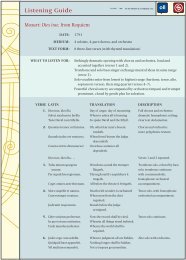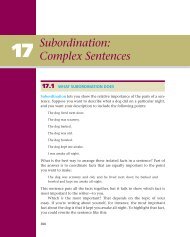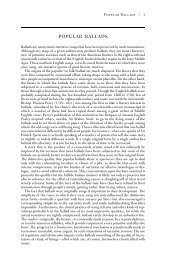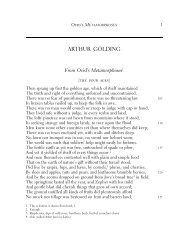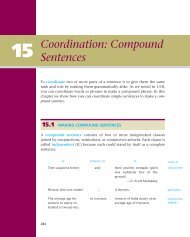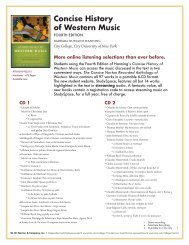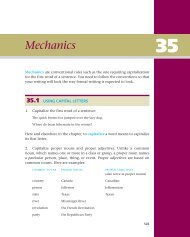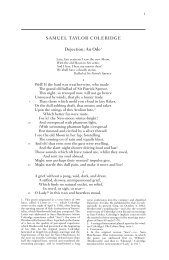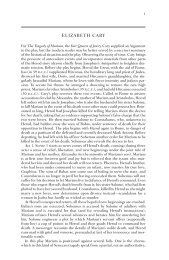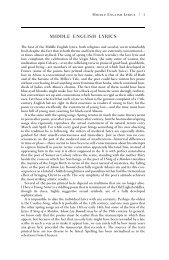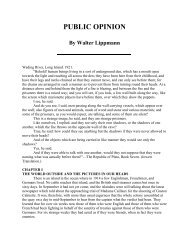ABIEZER COPPE From A Fiery Flying Roll - WW Norton & Company
ABIEZER COPPE From A Fiery Flying Roll - WW Norton & Company
ABIEZER COPPE From A Fiery Flying Roll - WW Norton & Company
You also want an ePaper? Increase the reach of your titles
YUMPU automatically turns print PDFs into web optimized ePapers that Google loves.
<strong>ABIEZER</strong> <strong>COPPE</strong><br />
When Winstanley declared that “every single man, male and female, is a perfect<br />
creature of himself,” needing no teacher or ruler other than the spirit<br />
within, the individualist strain of Puritanism might seem to have reached its<br />
limit. But there was another impulse at work also, antinomianism, the belief<br />
that the Mosaic law (the Ten Commandments) and the moral law itself are<br />
abrogated for the elect, who are saved by grace alone. Less extreme antinomians<br />
(like Milton) held that Christians were freed from the law in order to follow<br />
the law of love written in the heart, an even higher moral standard. But<br />
extremists, like Abiezer Coppe (1619–1672) and his fellow Ranters, held that<br />
the elect, saved by grace and inhabited by God, are perfect, are incapable of<br />
sin, and have a religious duty, by sinning freely, frequently and publicly, to<br />
demonstrate their sanctity. Drawn largely from the ranks of apprentices, distressed<br />
urban artisans, and itinerants of various sorts, Ranters flourished from<br />
1649 to about 1654: some cursed and blasphemed constantly, others drank to<br />
excess, smoked strong tobacco in their meetings, ran naked in the streets, and<br />
fornicated openly, often, and with multiple mates. They earned their name,<br />
Ranters, by their random, hectic, “inspired” discourse, rooted heavily in the<br />
Bible and the experiential; the Ranter prophetic voice attempts to escape from<br />
the usual forms and conventions of language. Abiezer Coppe, perhaps the most<br />
notorious Ranter, spent some time at Oxford University, then became an itinerant<br />
preacher; between jail terms he produced two tracts in 1649, both titled<br />
A <strong>Fiery</strong> <strong>Flying</strong> <strong>Roll</strong>, from which these extracts are taken.<br />
<strong>From</strong> A <strong>Fiery</strong> <strong>Flying</strong> <strong>Roll</strong><br />
***Behold, behold, behold, I the eternal God, the Lord of Hosts, who am<br />
that mighty Leveler, am coming (yea, even at the doors) to level in good earnest,<br />
to level to some purpose, to level with a witness, to level the hills with the valleys,<br />
and to lay the mountains low. 1<br />
High mountains! lofty cedars! it’s high time for you to enter into the rocks<br />
and to hide you in the dust for fear of the Lord and for the glory of his majesty.<br />
For the lofty looks of man shall be humbled and the haughtiness of men shall<br />
be bowed down, and the Lord ALONE shall be exalted in that day. ***<br />
Hills! Mountains! Cedars! Mighty men! Your breath is in your nostrils.<br />
Those that have admired, adored, idolized, magnified, set you up, fought for<br />
you, ventured goods and good name, limb and life for you, shall cease from you.<br />
You shall not at all be accounted of (not one of you), ye sturdy oaks who bow<br />
not down before eternal Majesty—Universal Love, whose service is perfect<br />
freedom, and who hath put down the mighty (remember, remember your forerunner),<br />
2 and who is putting down the mighty from their seats, and exalting<br />
them of low degree. ***<br />
And the prime leveling is laying low the mountains and leveling the hills in Man.<br />
1. Coppe’s prose is too saturated with biblical<br />
phrases and echoes to be fully annotated; here the<br />
phrasing is from Isaiah 40.<br />
2. Given the date of Coppe’s <strong>Roll</strong>, he may be alluding<br />
to Charles I.<br />
1
2 / Abiezer Coppe<br />
* * *<br />
The eternal God, the mighty Leveler is coming, yea come, even at the door; and<br />
what will you do in that day? ***<br />
Mine ears are filled brimful with cries of poor prisoners, Newgate, Ludgate<br />
cries (of late) are seldom out of mine ears. Those doleful cries, Bread, bread,<br />
bread for the Lord’s sake, pierce mine ears and heart, I can no longer forbear.<br />
Wherefore hie you apace to all prisons in the kingdom,<br />
Bow before those poor, nasty, lousy, ragged wretches, say to them, your humble<br />
servants, sirs (without a compliment), we let you go free and serve you, &c.<br />
Do this or (as I live, saith the Lord) thine eyes (at least) shall be bored out,<br />
and thou carried captive into a strange land.<br />
***Loose the bonds of wickedness, undo the heavy burdens, let the<br />
oppressed go free, and break every yoke. Deal thy bread to the hungry, and<br />
bring the poor that are cast out (both of houses and synagogues) to thy house.<br />
Cover the naked: hide not thyself from thine own flesh, from a cripple, a rogue,<br />
a beggar, he’s thine own flesh. <strong>From</strong> a whoremonger, a thief, &c., he’s flesh of<br />
thy flesh, and his flesh and whoredom is flesh of thy flesh also, thine own flesh.<br />
Thou mayest have ten times more of each within thee than he that acts outwardly<br />
in either. Remember, turn not away thine eyes from thine OWN<br />
FLESH.<br />
Give over, give over thy midnight mischief.<br />
Let branding with the letter B 3 alone.<br />
Be no longer so horridly, hellishly, impudently, arrogantly wicked as to judge<br />
what is sin, what not, what evil and what not, what blasphemy and what not.<br />
For thou and all thy reverend divines, so-called (who divine for tithes, hire,<br />
and money, and serve the Lord Jesus Christ for their own bellies), are ignorant<br />
of this one thing:<br />
That sin and transgression is finished, it’s a mere riddle that they with all<br />
their human learning can never read.<br />
Neither can they understand what pure honor is wrapped up in the king’s<br />
motto, Honi soit qui mal y pense. Evil to him that evil thinks. 4<br />
Some there are who are accounted the offscouring of all things, who are<br />
Noble Knights of the Garter. Since which—they could see no evil, think no evil,<br />
do no evil, know no evil.<br />
ALL is religion that they speak, and honor that they do.<br />
* * *<br />
A strange yet most true story; under which is couched that Lion whose roaring<br />
shall make all the beasts of the field tremble, and all the kingdoms of the earth<br />
quake. ***<br />
Follow me, who last Lord’s day, Septem. 30, 1649, met him in open field, a<br />
most strange deformed man, clad with patched clouts; who looking wishly 5 on<br />
me, mine eye pitied him; and my heart, or the day of the Lord, which burned<br />
as an oven in me, set my tongue on flame to speak to him, as followeth:<br />
How now friend, art thou poor?<br />
He answered, yea Master very poor.<br />
3. For Blasphemer. “Let”: cease.<br />
4. The motto of the Order of the Garter delights<br />
Coppe because it implies that evil exists only in the<br />
eye of the beholder.<br />
5. Intently.
A <strong>Fiery</strong> <strong>Flying</strong> <strong>Roll</strong> / 3<br />
Whereupon my bowels trembled within me, and quivering fell upon the<br />
worm-eaten chest (my corpse, 6 I mean), that I could not hold a joint still.<br />
And my great love within me (who is the great God within that chest or<br />
corpse) was burning hot toward him; and made the lock-hole of the chest, to<br />
wit the mouth of the corpse, again to open, thus:<br />
Art poor?<br />
Yea, very poor, said he.<br />
Whereupon the strange woman who flattereth with her lips and is subtle of<br />
heart said within me,<br />
It’s a poor wretch, give him twopence.<br />
But my EXCELLENCY and MAJESTY (in me) scorned her words, confounded<br />
her language, and kicked her out of his presence.<br />
But immediately the WELL-FAVORED HARLOT, 7 whom I carried not upon<br />
my horse behind me, but who rose up in me, said:<br />
—It’s a poor wretch, give him sixpence and that’s enough for a squire or<br />
knight to give to one poor body.<br />
—Besides (saith the holy Scripturian whore), he’s worse than an infidel that<br />
provides not for his own family.<br />
—True love begins at home, &c.<br />
—Thou and thy family are fed as the young ravens, strangely, though thou<br />
hast been a constant preacher, yet thou hast abhorred both tithes and hire; and<br />
thou knowest not aforehand who will give thee the worth of a penny.<br />
—Have a care of the main chance.<br />
And thus she flattereth with her lips and her words being smoother than oil;<br />
and her lips dropping as the honeycomb, I was fired to hasten my hand into my<br />
pocket; and, pulling out a shilling, said to the poor wretch, Give me sixpence,<br />
here’s a shilling for thee. 8<br />
He answered, I cannot, I have never a penny.<br />
Whereupon I said, I would fain have given thee something if thou couldst<br />
have changed my money.<br />
Then saith he, God bless you.<br />
Whereupon with much reluctancy, with much love, and with amazement (of<br />
the right stamp) I turned my horse head from him, riding away. But a while<br />
after I was turned back (being advised by my Demilance 9 ) to wish him call for<br />
sixpence, which I would leave at the next town at one’s house, which I thought<br />
he might know—Sapphira-like, 1 keeping back part.<br />
But (as God judged me) I, as she, was struck down dead.<br />
And behold the plague of God fell into my pocket, and the rust of my silver<br />
rose up against me and consumed my flesh as with fire; so that I and my money<br />
perished with me.<br />
I being cast into that lake of fire and brimstone.<br />
And all the money I had about me to a penny (though I thought through the<br />
instigation of my quondam Mistress to have reserved some, having rode about<br />
8 miles, not eating one mouthful of bread that day, and had drunk but one<br />
small draught of drink, and had between 8 and 9 miles more to ride ere I came<br />
6. Coppe puns on Latin Corpus and English<br />
corpse.<br />
7. The two women within Coppe may indicate,<br />
respectively, simple greed and hypocritical selfinterest.<br />
8. Give me change. A shilling was equivalent to<br />
twelve pence.<br />
9. Possibly a misprint for Delilah.<br />
1. Sapphira, the wife of Ananias, tried to cheat the<br />
Apostles of their just due (Acts 5).
4 / Abiezer Coppe<br />
to my journey’s end; my horse being lame, the ways dirty, it raining all the way,<br />
and I not knowing what extraordinary occasion I might have for money). Yet (I<br />
say) the rust of my silver did so rise up in judgment against me, and burnt my<br />
flesh like fire; and the 5th of James 2 thundered such an alarm in mine ears, that<br />
I was fain to cast all I had into the hands of him, whose visage was more marred<br />
than any man’s that I ever saw.<br />
This is a true story, most true in the history.<br />
It’s true also in the mystery.<br />
And there are deep ones couched under it, for it’s a shadow of various, glorious<br />
(though strange) good things to come.<br />
Well!—to return—after I had thrown my rusty cankered money into the poor<br />
wretch’s hands, I rode away from him, being filled with trembling, joy, and amazement,<br />
feeling the sparkles of a great glory arising up from under these ashes.<br />
After this, I was made (by that divine power which dwelleth in this Ark or<br />
chest) to turn my horse head—whereupon I beheld this poor deformed wretch<br />
looking earnestly after me; and upon that, was made to put off my hat, and bow<br />
to him seven times, and was (at that strange posture) filled with trembling and<br />
amazement, some sparkles of glory arising up also from under this, as also from<br />
under these ashes; yet I rode back once more to the poor wretch, saying,<br />
Because I am a King I have done this, but you need not tell anyone.<br />
The day’s our own.<br />
This was done on the last LORD’S DAY, Septem. 30 in the year 1649, which<br />
is the year of the Lord’s recompenses for Zion, and the day of his Vengeance, 3<br />
the dreadful day of Judgment. But I have done (for the present) with this story,<br />
for it is the latter end of the year 1649.<br />
2. James 5.1–6 fiercely denouncer the wealthy.<br />
“Your gold and silver is cankered; and the rust of<br />
them shall be a witness against you, and shall eat<br />
your flesh as it were fire” (5.3).<br />
1649<br />
3. Coppe may be recalling that January 30, just<br />
eight months before, was the day of King Charles’s<br />
execution.



